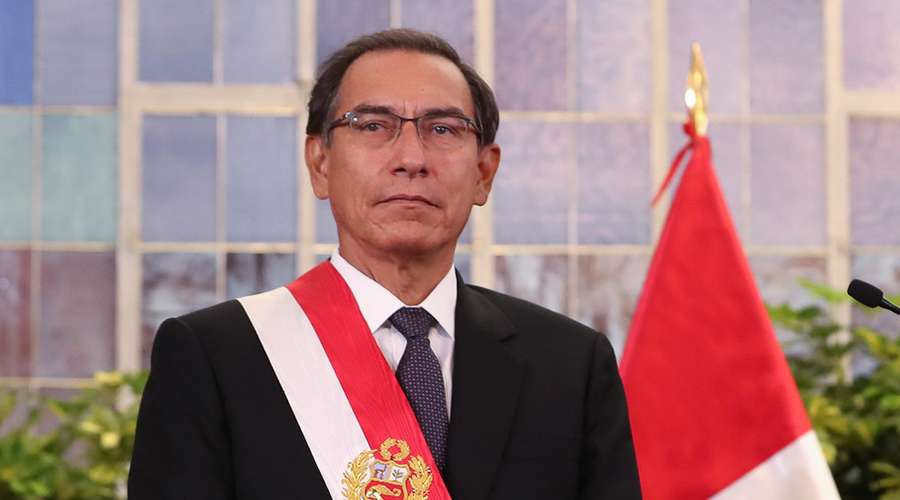RIO DE JANEIRO, BRAZIL – The Peruvian parliament has voted to open impeachment proceedings against President Martín Vizcarra for “moral incompetence”. The head of state must now face a hearing before the legislative chamber in the wake of the “Richard Swing” fraud scandal. It will then be decided whether or not the President may continue in office.
The required 52-vote quorum was reached to initiate the proceedings: 65 of 130 deputies voted “yes”. Next Friday, the head of state will be summoned to Parliament for questioning and a final vote. According to the constitution, a removal from office requires 87 votes – basically a two-thirds majority.
Background information: Last week, Edgar Alarcón, a member of parliament for the Union for Peru (UPP), released audio recordings of the president’s private conversations, in which he allegedly colluded with close advisors to conceal his involvement in the “Richard Swing” fraud from Congress.

Singer Richard Cisneros, who performs under the pseudonym “Richard Swing”, had been repeatedly contracted by the Ministry of Culture since 2017 for tasks such as consultations and motivational seminars, and in doing so received a total of US$50,000. The performer had no professional skills that could have justified such commissions.
The delicate aspect is that Cisneros had been involved in Vizcarra’s 2016 campaign for the vice-presidency. Several opposition politicians even speak of a friendship between him and the current president. The audio recordings also show how the president reports having met Cisneros several times during his term of office.
After the recordings became public, Vizcarra’s opponents filed charges with the Prosecutor General’s Office for perjury, abuse of office and attempted cover-ups.
Vizcarra stated that he had never denied a personal relationship with the singer, but rejected any suspicion that he had had any influence on Cisnero’s commissioning. “If you want to remove me from office, here I am,” said the head of state in a speech on Thursday.
According to Vizcarra, the disclosure of the audio files is yet another strategy by political forces in parliament to halt his anti-corruption efforts. Since taking office in 2018, the independent president has been in constant conflict with the legislature.
In last Friday’s vote, the far-right “We Can” factions, the Progressive Alliance and the left-nationalist UPP voted to remove him from office. The majority of the People’s Action (AP), which sees itself as a centrist party, is also in favor of the proceedings.
UPP deputy José Vega explains the process: “In the [recorded] conversation, it is clear that visits were made on three occasions. The president welcomed Richard Cisneros, the president lied to the country.”
The Left Progressive Broad Front, the Evangelical Agrarian Popular Front, the Liberal Purple Party as well as the right-wing parties “We are Peru” and the fujimorist “Popular Power” either abstained or voted against the proposal.
A number of AP deputies also diverged from the faction’s majority position – including deputy Luis Roel: “Under normal circumstances, these shameful audio recordings would be reason enough to remove any president from office. Nonetheless, it would not be responsible to inflict another political crisis upon the country amid a health and economic crisis.”
Francisco Sagasti of the Purple Party spoke of a proceeding based purely on “gossip, hearsay and questionable audio recordings”.
Despite the new allegations, Vizcarra continues to enjoy widespread popular support. After the vote in Congress, people in the capital gathered on their balconies and expressed their opposition to the impeachment amid the coronavirus crisis through “pot-banging” (cacerolazo).
The upcoming presidential elections are scheduled for April 2021. Vizcarra is not eligible for re-election under the law.
On Saturday, another explosive detail of the case was disclosed: In the run-up to the 2018 election, Congress President and AP member Manuel Merino had sought contact with the military leadership in order to secure the backing of the armed forces.
Defense Minister Jorge Chávez Cresta rejected any involvement of the military to the media: “The armed forces are fulfilling their constitutional role.” He added that in the current situation, a removal from office would not be “reasonable in any way”.

